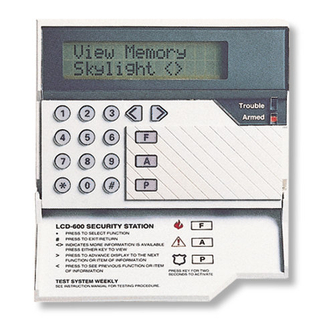DSC LCD-600 Instruction Manual - Page 4
Browse online or download pdf Instruction Manual for Keypad DSC LCD-600. DSC LCD-600 10 pages. Security station
Also for DSC LCD-600: Programming Manual (6 pages)

Testing
To insure that your system continues to function as intended, it is important that you
test the system weekly. See the testing procedure elsewhere in this manual. If your
system does not function properly, call your installing company for service.
Monitoring
This system is capable of transmitting alarms, troubles, and emergency information
over telephone lines to a monitoring station. If you inadvertently initiate an alarm,
immediately call the monitoring station to prevent an unnecessary response.
Note: The monitoring function must be enabled by the installer before it
becomes functional.
General System Operation
Your security system is made up of a DSC control panel, one or more LCD-600
security stations and various detectors and sensors. The DSC control panel will be
mounted out of the way in a utility room or basement. The metal cabinet contains
the system electronics, fuses and stand-by battery. There is normally no reason for
anyone but the installer or service person to have access to the control panel. The
LCD-600 keypads have an audible indicator, an alphanumeric LCD, (Liquid Crystal
Display), and command entry keys. The keypad is used to send commands to the
system and to display the current system status. The security station(s) will be
mounted in convenient locations inside the protected premises close to the exit-
entry doors.
The security system has several zones or areas of protection and each of these
zones will have one or more detection sensors connected to it (motion detectors,
glassbreak detectors, door contacts or shock sensors). When a sensor is in alarm,
the zone in alarm will be displayed on the LCD-600 security station.
Trouble and Armed LED Displays
The LCD-600 has a yellow LED on the right side of the keypad which represents
the trouble status of the panel. There is a red LED just below the yellow one which
represents the armed status of the panel.
2
Fire Alarm Operation
Alarm
The bell/siren will pulse.
The digital communicator transmission is delayed for 30 seconds. If the alarm is
not acknowledged (silenced) within 30 seconds, the communicator will transmit to
the monitoring station.
Silence
To silence the bell/siren press the [#] key.
If the alarm is silenced within 30 seconds, transmission to the monitoring station will
be aborted.
If the alarm is silenced and the smoke detector is not reset, the alarm will resound
after 90 seconds.
Reset
To restore the smoke detector to normal, press [ ] to enter the "functions list"
Scroll to find,
press and hold [4] for 5 seconds on a
Press (4) for...
PC3000, PC2550 or PC2500.
Reset Sensors
If you have a PC1500 or PC1550 and your installer has installed smoke detectors
which must be reset to clear an alarm then press [ ] [7].
If the detector is clear of smoke the system will return to normal.
Note: If you suspect that the communicator has transmitted and there is no
fire condition, call the monitoring station immediately to avoid an
unnecessary response.
If a fire condition is apparent, follow your evacuation plan immediately. If the
alarm sounds at night evacuate immediately.
Fire Safety in the Home
Most fires occur in the home and to minimize this danger it is recommended that a
household fire safety audit be conducted and a family escape plan be developed.
Household Fire Safety Audit
1. Are all electrical appliances and outlets in a safe condition e.g. frayed cords,
over-loaded lighting circuits? If you are uncertain about the condition of your
electrical appliances or household service, have a professional evaluation.
2. Are all flammable liquids stored safely in closed containers in a well ventilated
cool area? Cleaning with flammable liquids should be avoided.
3. Are fire hazardous materials (matches) well out of reach of children?
4. Are furnaces and wood burning appliances properly installed, clean and in good
working order? Have a professional evaluation.
15
